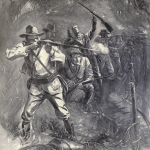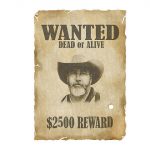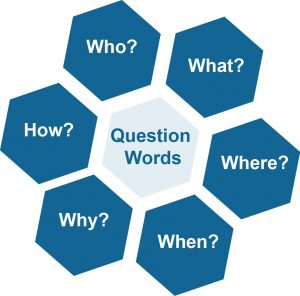The Gentleman Bandit
Reading Strategy
In the last chapter, you learned a pre-reading strategy called Predict. You looked at the title, pictures, and words from the story to guess what it was about.
In this chapter, you will use a pre-reading strategy called Question. Asking questions about the topic in the reading helps stir up our interest. When we read with questions in mind, it helps us make sense of what we read.
Here are some question words:
Try this
1. Find The Gentleman Bandit in your reader. Look at the title and pictures. Use a dictionary to look up any words in the title that you do not know. What is the subject of the reading?
2. Ask your instructor for the Question sheet, or open and print one from the link.
3. Under I wonder…, make a list of five questions you have about this subject.
Example: What was the bandit’s real name? What did he steal? Did he get caught?
Word Attack Strategy
Word Patterns
![]() Sometimes when you get stuck on a big word, it helps to look for smaller words inside of the big word.
Sometimes when you get stuck on a big word, it helps to look for smaller words inside of the big word.
- Gentleman is a big word. But it is made up of two smaller words: gentle and man. We can guess what the word means by looking at its parts. A man who is gentle might be a man who treats people in a nice way.
- Railroad is another big word. But it is made up of two smaller words too: rail and road. We can guess what the word means by looking at its parts. A road with rails on it might be a train track.
Sometimes two words describe just one thing.
- Prison fence is made of two words that describe just one thing.
Split these big words into smaller words
Then guess what they might mean. Match the word to each picture.
1. newspaper
2. campfire
3. gunfight
 |
 |
 |
| a | b | c |
Match each set of two words to just one picture
4. train bandit
5. wanted poster
6. passenger car
7. police officer
8. British Columbia
 |
 |
 |
 |
 |
| d | e | f | g | h |
Use Your Strategies
Read The Gentleman Bandit in your reader. Look for the answers to your questions as you read.
Try this
When you have finished reading, write down the answers in your Question chart, under I learned…

Check Your Understanding
Put these events from Bill Miner’s life in the right order
1. His friends dug a hole under the prison fence.
2. He came to British Columbia.
3. He robbed a train near Kamloops.
4. He escaped back to the United States.
5. He robbed a train near Mission.
6. He only made $15.50.
7. The police put him in prison.
8. He got $7,000 in gold.
Grammar
Grammar Rule
The simple past tense is used to talk about events that started and ended in the past (yesterday, last night, three days ago).
Most simple past verbs are formed by adding –ed to a verb.
Example: On a September day in 1904, a CPR train stopped outside of Mission.
The verb in this sentence is stop. To make it a simple past verb, we add an –ed ending.
Copy these sentences and circle the simple past verbs
1. In the days before cars, people and goods travelled long ways on horses and trains.
2. Bill needed to escape.
3. He slipped across the border into Canada.
4. He played the fiddle.
5. He showed people how to dance.
Find the verbs in these sentences
Change these sentences to simple past by adding –ed to the end of the verbs.
6. The bandits climb onto the train.
7. They unhook the passenger car.
8. They grab the gold.
9. They wish the train workers a good night.
10. They walk off into the night.
11. They share their money.
Grammar Rule
Some verbs break this grammar rule. For some verbs, you cannot add –ed to the end. These verbs are called irregular verbs.
Be is one of these verbs. The simple past forms of be are was and were.
Write down the subjects and verbs from these sentences
12. Horses and trains were easy targets for bandits.
13. Bill Miner was one of the most infamous train bandits.
14. George Edwards was the name he gave people.
15. He was a charming man.
16. The robbery was in all of the newspapers across British Columbia.
Here are some other irregular verbs — verbs that break the simple past grammar rule.
Caught is the simple past form of catch.
Felt is the simple past form of feel.
Found is the simple past form of find.
Gave is the simple past form of give.
Knew is the simple past form of know.
Ran is the simple past form of run.
Took is the simple past form of take.
Told is the simple past form of tell.
Try this
Pick three words from the words below. Write one sentence about Bill Miner for each word.
| caught | found | knew | took |
| felt | ran | gave | told |
Writing
How do you think Bill Miner got out of British Columbia without anyone seeing him? Create a paragraph telling the story of how he got away.
Make a web
Just like last time, plan out your ideas using a web.
1. Ask your instructor for a Make a Web sheet, or open and print one from the link.
2. In the big shape, write Bill Miner. He is the subject of your story.
3. In each of the smaller shapes, write one of these questions:
a. Who helped him escape?
b. How did he travel across the border?
c. Where did he go?
d. How did he spend the rest of his life?
4. Brainstorm answers for each question. Be creative!
Now you are ready to put your ideas into a paragraph.
Writing Task
Pretend you are Bill. You are writing in your journal. Write a paragraph about your escape from prison. Begin your journal like this:
Tonight, I finally escaped from prison! My friends dug a hole under a fence. I climbed out. Then I…
Write your sentences in past tense.
When you have finished:
- Check to make sure all your sentences are complete.
- Ask your instructor for feedback.
- Write a final copy based on your instructor’s feedback.
- Hand in your final copy with your web and your first copy.
Answer Key
| Word Attack Strategy | |
| QUESTION | ANSWER |
| 1 | b |
| 2 | c |
| 3 | a |
| 4 | d |
| 5 | f |
| 6 | h |
| 7 | g |
| 8 | e |
| Check Your Understanding | |
| QUESTION | ANSWER |
| 2 | He came to British Columbia. |
| 5 | He robbed a train near Mission. |
| 8 | He got $7,000 in gold. |
| 3 | He robbed a train near Kamloops. |
| 6 | He only made $15.50. |
| 7 | The police put him in prison. |
| 1 | His friends dug a hole under the prison fence. |
| 4 | He escaped back to the United States. |
| Grammar | ||
| QUESTION | ANSWER | |
| 1 | travelled | |
| 2 | needed | |
| 3 | slipped | |
| 4 | played | |
| 5 | showed | |
| 6 | The bandits climbed onto the train. | |
| 7 | They unhooked the passenger car. | |
| 8 | They grabbed the gold. | |
| 9 | They wished the train workers a good night. | |
| 10 | They walked off into the night. | |
| 11 | They shared their money. | |
| SUBJECT | VERB | |
| 12 | Horses and trains | were |
| 13 | Bill Miner | was |
| 14 | George Edwards | was |
| 15 | He | was |
| 16 | The robbery | was |
Attributions
Photo a by BrokenSphere is in the public domain.
Photo b by Jon S is used under a CC-BY 2.0 license.
Photo c by unknown is in the public domain.
Photo d by unknown is in the public domain.
Photo e by unknown is in the public domain.
Photo f by RadtasticBxtch is used under a CC-BY 2.0 license.
Photo g by unknown is in the public domain.
Photo h by amandaelizabeth84 is in the public domain.


